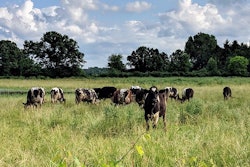
Phibro Animal Health Corp. is pursuing patent protection after what it calls a “significant advance in the ongoing development of a vaccine for African swine fever (ASF).”
The Teaneck, New Jersey-based animal health company said its vaccine development process “involves the identification of immunogenic epitopes and proteins that show strong potential to form the basis for a vaccine against ASF.”
Researchers identified the epitopes and proteins by using a “unique bioinformatics analysis tool in order to select for the highest potential epitopes and proteins capable of eliciting protective immune response,” according to a press release from the company. “Phibro’s approach is to create a specific epitope-based vaccine, rather than following the more conventional path of an attenuated live vaccine. If successful, this approach would not only be an effective response to ASF but would result in a vaccine that presents no risk of further spreading the disease.”
“ASF’s decimation of China’s swine population represents not just a crisis for the entire swine husbandry industry but, more importantly, a food security crisis for mankind,” said Jack Bendheim, Phibro’s chairman, president and CEO. “The identification of this group of peptides and proteins is a key milestone in Phibro’s pursuit of a solution for this devastating disease. While we still have much work ahead of us, we have made important progress toward reaching that goal and we take pride in potentially being part of the solution to such an urgent problem.”
Challenges to developing an ASF vaccine
Vaccines for relatively simple viruses can be made by killing the virus and injecting it into the animal. The dead virus is unable to cause actual illness, but the host’s immune system recognizes and remembers the virus in the event of future exposures. But ASF is different. A massive, complex virus that contains more than 100 genes, ASF has so far managed to evade even advanced attempts at developing an effective vaccine.
The simple approach — killing the virus and injecting it into the animal — doesn’t work because ASF is capable of producing proteins that aren’t present in the dead virus. The host immune system is unable to recognize these additional proteins when the live virus is encountered.
To protect against ASF, any successful vaccine must either contain key proteins expressed by the live virus, or else contain the live virus itself — a risky proposition with regard to a virus capable of surviving in the environment for months without a host, and that kills most of the swine it infects.
View our continuing coverage of the African swine fever outbreak.

















